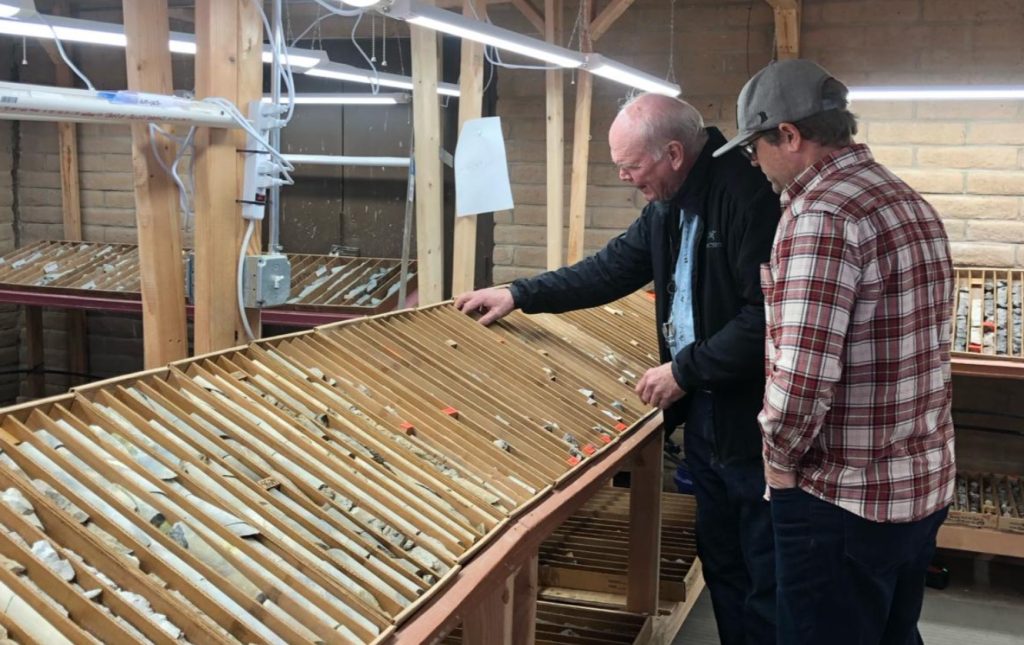Barksdale Resources posts final assays from SUN-003, Arizona

Barksdale Resources Corp. [TSXV-BRO; OTCQX-BRKCF] provided assays from the lower portion of the SUN-003 drill hole, completed as part of the ongoing Phase I drill program at the Sunnyside copper-lead-zinc-silver exploration project in Arizona.
Highlights: Barksdale intercepted multiple intervals of carbonate replacement style mineralization (CRD) in SUN-003, including assays released previously.
Additional assays from the lower zones of polymetallic CRD mineralization intersected in SUN-003 include the following results: 2.28m grading 1.72% Zn, 0.63% Pb, 13.5 g/t Ag, and 0.016 g/t Au from 1480.57m depth; and 1.01m grading 0.46% Cu, 11.9% Zn, 3.8% Pb, 377 g/t Ag, and 0.028 g/t Au from 1550.67m depth.
Barksdale aims to provide guidance for the remaining 2024 drill campaign within the next 30-45 days.
Rick Trotman, President and CEO stated, “The final assays from the lower portion of SUN-003 contains multiple additional zones of narrow polymetallic CRD mineralization outboard of the higher-grade feeder structure. We look forward to drilling to the southeast of SUN-003, where our model suggests that we’ll vector into areas of increased structural preparation, heat, and fluid flow. Once we have multiple pierce points into that higher-grade corridor, we can begin stepping out to determine the true scale of the zone as it trends back towards the porphyry. The Company is actively exploring a range of strategic opportunities for our upcoming drilling initiatives. We look forward to sharing these advancements with our valued investors in the coming 30-45 days.”
SUN-003 is a vertical hole collared 2m from historic hole TCH-2 and was drilled to a total depth of approximately 1,653m. It drifted slightly to the north-northeast and intersected the top of the Paleozoic carbonate rocks at 1,239m depth, approximately 65m to the north and 80m deeper than discovery hole TCH-2. This confirms the general dip of the carbonate stratigraphy to be approximately 35 degrees to the north.
Over a dozen distinct horizons of strata-bound sulfide mineralization were intersected, which correlate with intercepts of historic hole TCH-2, located approximately 65m to the southwest, as measured from the top of the carbonate sequence, and roughly 95m distant at the bottom of SUN-003. TCH-2 displays intense calc-silicate alteration (i.e. garnet and epidote, with frequent quartz veins), suggesting a closer proximity to a heat and fluid source. Based on mineral assemblages present in SUN-003 and weak calc-silicate alteration seen, it is interpreted to be distal to the mineralizing feeder structure/intrusion source.
SUN-003 encountered the Concha, Scherrer and Epitaph Formations within the carbonate sequence, with mineralized horizons present in all three units. The Concha Formation contained two zones of disseminated polymetallic mineralization (Cu, Ag, Pb, Zn) which was hosted by favourable porous “dirty” limestones. Calc-silicate alteration was weak and included minor garnet (Ca/Fe), diopside, saponite, smectite, epidote, chlorite, and actinolite.
Below the Concha, the Scherrer Formation, which is well-correlated across the region, contains distinct intercalated marker beds of sandstone beds within the limestone unit. Within the Scherrer Formation SUN-003 intersected eight zones of polymetallic mineralization (Cu, Ag, Pb, Zn) that contained weak calc-silicate alteration including garnet (both Mn/Al and Ca/Fe), diopside, smectite, saponite, epidote, chlorite, actinolite, and irregular veinlets of pink calcite. Mineralization is stratigraphically controlled and commonly forms ‘patchy’ textures.
The final carbonate unit encountered was the Epitaph Formation, which contained three visually confirmed narrow zones of polymetallic base metal (Pb, Zn > Cu) mineralization in silty limestone. Mineralization is typically associated with weak calc-silicate alteration including the presence of smectite, saponite, diopside, green garnet, reddish hematite, rhodochrosite, and potassium feldspar in patches. The hole was terminated at approximately 1,653m depth.
Barksdale Resources Corp., a 2023 OTCQX BEST 50 Company, is a base metal exploration company focused on the acquisition, exploration and advancement of highly prospective base metal projects in North America. Barksdale is currently advancing the Sunnyside copper-zinc-lead-silver and San Antonio copper projects, both of which are in the Patagonia mining district of southern Arizona, as well as the San Javier copper-gold project in central Sonora, Mexico.
